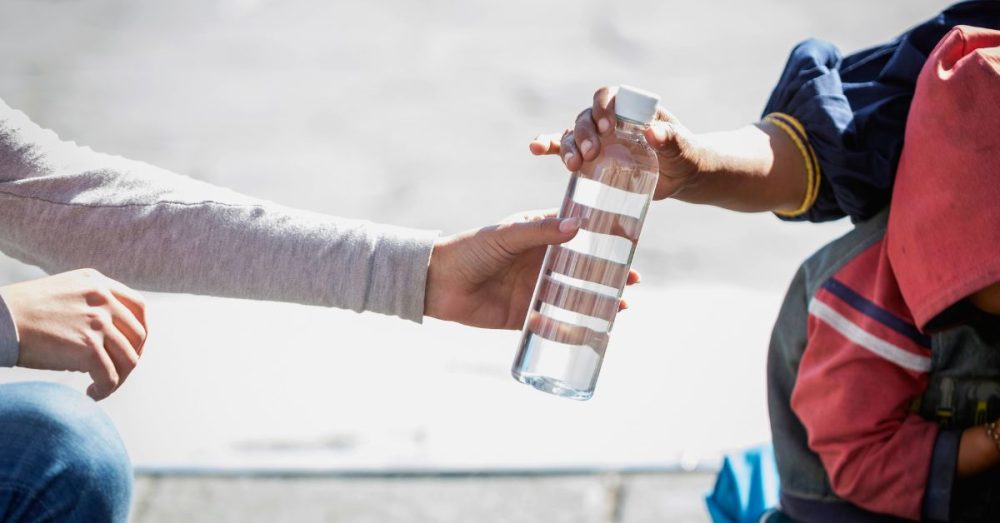The faith-based outreach center OurCalling is extending its hours this summer to help people experiencing homelessness find relief from extreme heat.
“We stay open when it gets above the heat index,” founder and CEO Wayne Walker told Fox 4 KDFW this week. “It gets dangerous. We want to make sure people have a safe place to stay while we’re working on those exit plans, trying to help people get off the streets for the rest of their lives.”
At OurCalling, visitors can access showers, laundry services, breakfast and lunch, and other services.
“People need something to carry with them to help address this heat — a cold towel over their back, water bottles, all the shade and sunscreen, those kinds of things that you and I would want,” Walker said, per Fox 4. “At our facility located near downtown, we have 3,000 to 5,000 people a day that’ll come to us just to seek refuge — a hot meal, a place to take a shower, a place to get out from this heat.”
OurCalling works with about 10,000 people experiencing homelessness each year, visiting more than 4,000 locations in Dallas, Walker said.
“Last summer, we stayed open almost 60 different days … until the heat index got into a safe place. But that’s what you would do for your family, right? You want to make sure they’re safe and they have a place to stay outside of this weather,” he said.
While people in the DFW got some respite from the heat this week, with a little rain and looming Hurricane Beryl bringing highs down to the 90s, there will almost certainly be a number of 100-plus days ahead.
Walker founded OurCalling in 2009. Last year, the organization employed more than 50 people and had the help of over 3,000 volunteers. It helped people exit homelessness 1,359 times.
Other groups have also been working to help get people off the street and restart their lives.
The Bridge
An organization that provides day shelter and emergency night services, The Bridge is “taking significant steps to support the unsheltered population in Dallas during the extreme heat,” a spokesperson said in an email.
“Our highly trained outreach team works tirelessly on the streets of Dallas, providing essential basic resources like water [and] emergency kits, and inviting homeless individuals to The Bridge campus for day shelter services,” the email read.
On July 1, The Bridge hosted 714 people seeking day shelter services. Another 65 visitors were offered overflow night shelter accommodations.
“The economic and interpersonal challenges in our community at this time are fueling a dramatic spike in the number of citizens seeking day and night shelter services on The Bridge campus,” CEO David Woody III said in the email. “That The Bridge can be a space of safe [to] secure respite while empowering our guests to at least contemplate their exit from homelessness is our goal. … Offering hydration, clothing, showering, air conditioning, and relationship support reflects some of our engagement options. The Bridge appreciates the community support, contributions, and volunteer support at this time.”
The Bridge offers “basic needs services” in addition to access to health care, employment opportunities, and long-term housing.
Polling conducted by The Dallas Express shows that some 75% of Dallas voters believe homelessness, vagrancy, and aggressive panhandling are “major” problems in the city. Respondents also appeared to be generally supportive of Haven for Hope in San Antonio’s “one-stop-shop” homeless services model. The model has been credited with a 77% reduction in unsheltered homelessness in the city’s downtown area.
Some local stakeholders want to bring the model to Dallas. However, it is unclear whether City officials will support such a measure.
Other Services
Cooling stations are available at Dallas public libraries and recreation centers. Austin Street Center also provides basic needs, and the Salvation Army offers cooling stations at Oak Cliff Corps Community Center, Pleasant Grove Corps Community Center, and the Carr P. Collins Social Service Center, as well as at facilities across North Texas.
“Extreme heat can lead to heat stroke, heat cramps, heat exhaustion, dehydration, and death,” the CDC’s website shows. “Anyone can be at risk, but some are more vulnerable, including pregnant women, people with heart or lung conditions, young children, older adults, athletes, and outdoor workers.”


